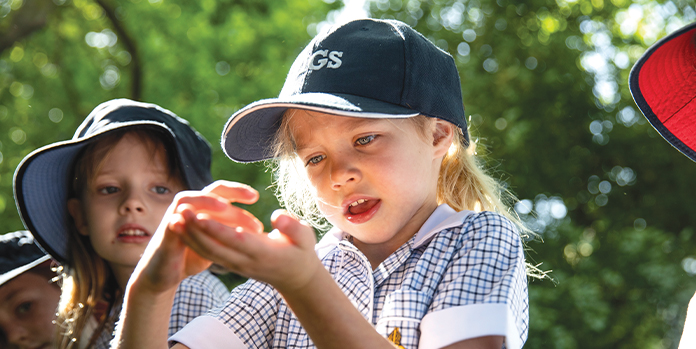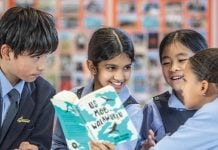Children love to play.
At Grimwade House, we take this enthusiasm and steer it towards academic and social learning while still maintaining the joy and excitement of investigations. We call it purposeful play.
While all play involves creativity and the development of social skills, purposeful play is different to the unstructured play that occurs in the playground. This intentional play is linked to the explicit content and skills being taught in our classrooms. Teachers purposefully provide opportunities for students to explore topics being covered in class in a more open ended – or playful – way.
We regard purposeful play as being a core element of our learning program, particularly at the Junior Primary levels (Prep to Year 2). Here, sparking the imagination of students and developing their creativity is just as important as building literacy, numeracy, and other cognitive skills.
Play provides a complex integration of various skills within a meaningful context.
Building on engagement and interest
As part of the learning and teaching program in Junior Primary levels, each week we provide the time, environment, and materials to facilitate discovery and experimentation through activities that are linked to both core learning outcomes and children’s interests.
The first step of learning is engagement, so teachers seek to build their purposeful play framework around their students’ curiosity and interests.
As just one example, when studying the topic ‘Money’, a Year 1 class expressed interest in creating their own imaginary shoe shop. After discussing questions about the nature of a shop, types of shoes and how they are made, students set about building their own new mini-world.
Some were given a blank piece of paper and a pen, which they quickly turned into a price list. Some built the shop itself, others created the shoes, and some developed shoe seller personas. Each child engaged with the idea in the way that best suited them, while still building their academic knowledge, social skills, and having fun.
Developing social skills and preparedness to try
Whatever the scenario, students are engaged in activities during purposeful play that will build life-long social skills such as negotiation, problem-solving as a team, and self-regulating when something doesn’t go exactly the way they want it to. They also improve their ability to empathise with others and to make sensible choices and decisions.
Crucially, these investigations are a way to give students permission to experiment, free from any sense that they might “fail”. When they play, there is no right or wrong. The pressure is off, and hesitation is replaced by a sense of curiosity and discovery.
During the Junior Primary years students develop their attitudes to learning and schooling, so it is essential that they find their journey with us to be enjoyable, rewarding and stimulating. Purposeful play provides a balance against more structured activities, and helps link learning with positive experiences. This, in turn, promotes the mindset upon which great learners are built.
Purposeful play in the outdoors
Purposeful play is not limited to the classroom environment at Grimwade House.
The myriad of sensory experiences available in the natural environment adds to children’s understanding of their immediate world and their place within it. Whether in sun, water, wind, or rain, exploring how your body moves and responds in different scenarios and how these make you feel, is vital for young children.
For example, imagine building a detailed fairy village in a garden which includes a bridge over a bubbling brook, and creating fairy characters who live and interact in the village. It seems simplistic, but if your classroom topic is ‘Fairy Tales’, the learning from this activity can be profound.
In addition, young students are still learning about connection between their brain and body. Purposeful play in the outdoors also supports the interaction between physicality and intellectual growth.
Having the buildings and grounds that support all aspects of our learning program, including purposeful play, is central to our educational aims at Grimwade House. While some buildings may constrain what teachers and students can do, those that are designed with learning outcomes in mind encourage deeper engagement during both structured learning and investigations. This is why we are looking towards building a new, more flexible Junior Primary space at Grimwade House.
Of course, valuing play is more than a pedagogy. It is an attitude that supports students as they grow older and begin to focus on the increasing intellectual demands of their education. By encouraging a love of play in our youngest students, we build an approach to learning that will serve them throughout their lives.
Caroline Beilby
Head of Junior Primary
About Caroline Beilby
Caroline Beilby has been the Head of Junior Primary at Melbourne Grammar School since 2021.
She has extensive experience teaching and developing programs for children in years Prep to Year 2, having been a teacher within those year levels for more than 16 years.



